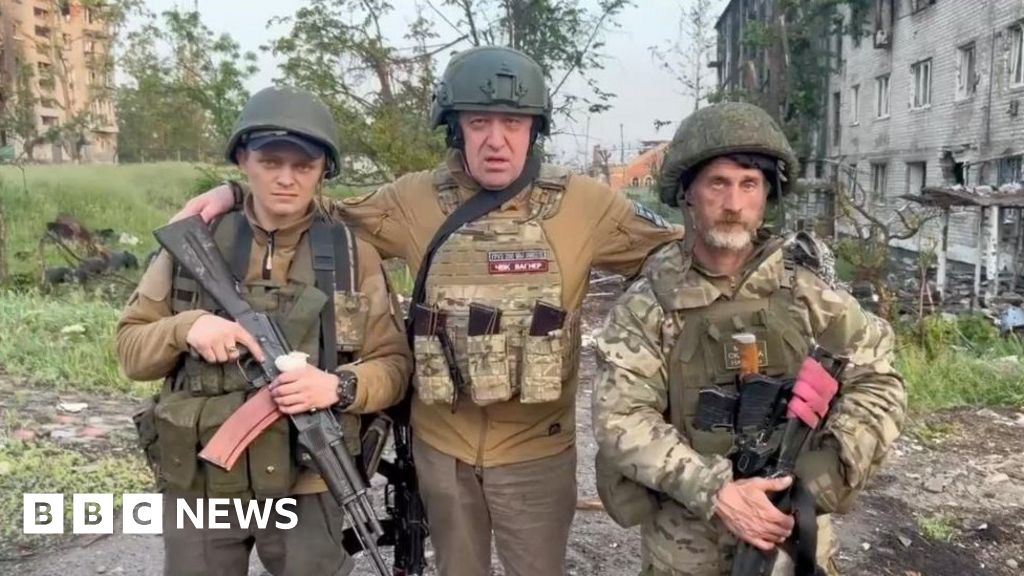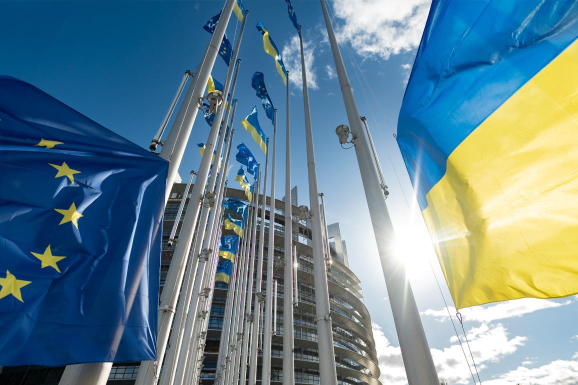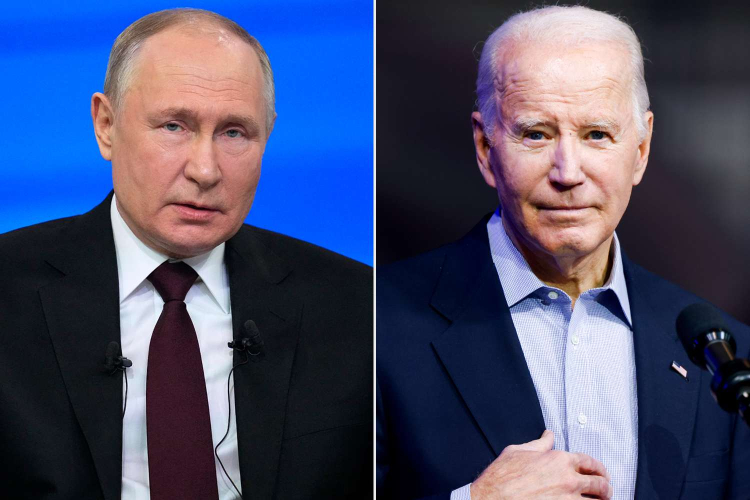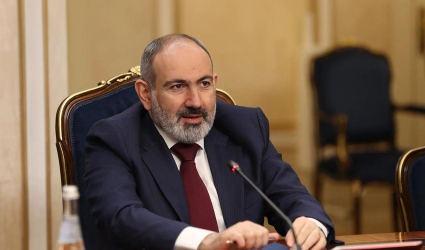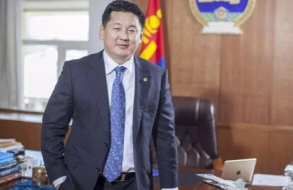Russia is offering governments in Africa a "regime survival package" in exchange for access to strategically important natural resources, a major new report has found.
Internal Russian government documents, seen by the BBC, also detail how it is working to change mining laws in West Africa, with the ambition of dislodging Western companies from an area of strategic importance.
This is part of the process of the Russian government taking over the businesses of the Wagner mercenary group, broken up after a failed coup in June 2023.
The multibillion dollar operations are now mostly being run as the Russian "Expeditionary Corps", managed by the man accused of being behind the attempt to murder Sergei Skripal using the Novichok nerve agent on the streets of the UK - a charge Russia has denied.
"This is the Russian state coming out of the shadows in its Africa policy," says Jack Watling, land warfare specialist at the Royal United Services Institute (Rusi) and one of the report's authors.
Back in June 2023, Yevgeny Prigozhin was probably the most feared and famous mercenary in the world. His Wagner Group was in control of billions of dollars' worth of companies and projects, while his fighters were central to Russia's invasion of Ukraine.
Then, he decided to march on Moscow, ostensibly calling for the removal of the defence minister and head of the general staff, but in reality threatening President Vladimir Putin in a way no-one had before.
Within weeks he had died in a highly suspicious plane crash, along with much of the Wagner leadership. There was widespread speculation at the time about what would happen to the Wagner Group. Now, we have the answer.
According to Dr Watling, "there was a meeting in the Kremlin fairly shortly after Prigozhin's mutiny, in which it was decided that Wagner's Africa operations would fall directly under the control of Russian military intelligence, the GRU".
Control was to be handed to Gen Andrey Averyanov, head of Unit 29155, a secretive operation specialising in targeting killings and destabilising foreign governments.
But it seems Gen Averyanov's new business was not destabilising governments, but rather securing their future, as long as they paid by signing away their mineral rights.
In early September, accompanied by deputy Defence Minister Yunus-Bek Yevkurov, Gen Averyanov began a tour of former Wagner operations in Africa.
They started in Libya, meeting warlord Gen Khalifa Haftar. Their next stop was Burkina Faso where they were greeted by 35-year-old coup leader Ibrahim Traoré.
After that, they landed in the Central African Republic, possibly the most well-established Wagner operation on the continent, before heading to Mali to meet the leaders of the junta there.
On a subsequent trip they also met General Salifou Modi, one of the military men who seized power in Niger last year.
Readouts of the various meetings demonstrate that the two men were reassuring Wagner's partners on the continent that the demise of Prigozhin did not mean the end of his business deals.
Reports of the meeting with Capt Traoré of Burkina Faso confirmed cooperation would continue in "the military domain, including the training of Burkinabe officer cadets and officers at all levels, including pilots in Russia".
In short, the death of Prigozhin did not mean the end for the junta's relationship with Russia. In some ways, it would become deeper still.
The three West African states with close links to Wagner - Mali, Niger and Burkina Faso - have all experienced military takeovers in recent years. They have since announced their withdrawal from the regional bloc Ecowas, and the creation of their own "Alliance of Sahel States".
Maybe the most entwined with the mercenaries was Mali, where an ongoing Islamist insurgency, combined with multiple coups, had left an essentially failed state.
Previously, security assistance had come in the form of the UN mission known as Minusma, alongside the French military's long-running counter-insurgency operation.
But there was no particular fondness for France, the former colonial power, and so when the Wagner group offered to replace their security operations with Russian backing, the offer was accepted.
"The French were tolerated, rather than welcomed," says Edwige Sorgho-Depagne, an analyst of African politics who works for Amber Advisers.
"The French mandate to help in the terror crisis in the Sahel was always regarded as limited in time. So, the fact that the French stayed for that long - over 10 years - without finding a way to end the crisis didn't help".
Beyond pragmatism, there was also nostalgia. "In these countries, Russia is not a new ally. Russia was there before in the 1970s and 1980s."
"There's this dream of getting back to a better time, which is often associated with the relationship with Russia."
But for the military juntas running these countries, Russia's military presence has obvious benefits.
"Initially, these juntas were transitional leaders. They were supposed to organise elections and bring about a return to democratic institutions."
"But now Russian paramilitaries are brought in to protect the military junta, allowing them to stay as long as they want."
The junta ordered the French forces to leave and Mali is now largely dependent on Wagner for its internal security, a change that is having an immediate impact on ordinary Malians.
"What the Russians have provided is a strike force, with helicopters with advanced capabilities and a lot of firepower," says Dr Watling. "They are using pretty traditional Soviet anti-partisan methods. You see fighters who were executed, as well as civilians targeted for enabling or being associated with fighters."
There have been multiple claims that Wagner forces carried out human rights abuses on the African continent, as well as in Ukraine and Syria, where Prigozhin's organisation previously held a commanding presence.
One of the most well-documented incidents took place in the central Malian town of Moura where, according to a UN report, at least 500 people are believed to have been summarily executed by Malian troops and "armed white men", who eyewitnesses described as speaking an "unknown language".
While independent verification has not been possible, Human Rights Watch identified the unknown white attackers as Russian mercenaries.
In exchange for considerable, if brutal, security assistance, Wagner required something in return.
Mali, like many African nations, is rich in natural resources - from timber and gold to uranium and lithium. Some are simply valuable, while others have strategic importance as well.
According to Dr Watling, Wagner was operating in a well-established tradition: "There is a standard Russian modus operandi, which is that you cover the operational costs with parallel business activity. In Africa, that is primarily through mining concessions."
In every country in which it operates, Wagner was reported to have secured valuable natural resources using these to not only cover costs, but also extract significant revenue. Russia has extracted $2.5bn (£2bn) worth of gold from Africa in the past two years, which is likely to have helped fund its war in Ukraine, according to the Blood Gold Report.
This month, Russian fighters - formerly Wagner mercenaries - took control of Mali's Intahaka gold mine, close to the border with Burkina Faso. The artisanal mine, the largest in northern Mali, had been disputed for many years by various armed groups active in the region.
But there is something else, with potential geopolitical significance.
"We are now observing the Russians attempting to strategically displace Western control of access to critical minerals and resources," says Dr Watling.
In Mali, the mining code was recently re-written to give the junta greater control over natural resources. That process has already seen an Australian lithium mine suspend trading on its shares, citing uncertainty over the implementation of the code.
While lithium and gold mines are clearly important, according to Dr Watling there is possibly an even greater strategic headache around the corner: "In Niger the Russians are endeavouring to gain a similar set of concessions that would strip French access to the uranium mines in the country."
The report details internal Russian memos focussed on trying to achieve in Niger what was done in Mali. If Russia managed to gain control of West Africa's uranium mines, Europe could be left exposed once again to what has often been called Russian "energy blackmail".
France is more dependent on nuclear power than any other country in the world, with 56 reactors producing almost two-thirds of the country's energy. About a fifth of its uranium is imported from Niger. There have previously been complaints about the terms of trade, with suggestions that the former colonial power exploits nations like Niger.
"The narrative that Russia is pushing is that Western states remain fundamentally colonial in their attitude," says Dr Watling. "It's very ironic because the Russian approach, which is to isolate these regimes, capture their elites and to extract their natural resources, is quite colonial."
In reality, the "Expeditionary Corps'' appears more as "Wagner 2.0", than a radical departure for Russian foreign policy. Prigozhin had built deep political, economic and military ties on the African continent - dismantling this complex web would have been difficult and ultimately counter-productive.
The "Expeditionary Corps" is operating in the same countries, with the same equipment and - it seems - with the same ultimate goal.
According to Dr Watling, the fundamental change lies in "the overtness with which Russia is pursuing its policy". Prigozhin's Wagner Group had always provided Russia with a level of plausible deniability in operations and influence abroad.
Following the full-scale invasion of Ukraine, many in the Western security apparatus say that Russia's mask has slipped.
"What they are looking to do is to exacerbate our crises internationally. They are trying to start fires elsewhere, and expand those that already exist, making a less safe world," Dr Watling.
"Ultimately, it weakens us in the global competition that we are currently facing. So the impact is not immediately felt, but over time, it is a serious threat."

